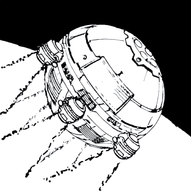Difference between revisions of "Aqueduct"
m (→Description: Spelling fix) |
|||
| Line 35: | Line 35: | ||
The ship is noted for its simplicity and sturdy design which allowed it to survive the loss of technology during the [[BattleTech eras|Succession War era]].<ref name=HBMPS/> | The ship is noted for its simplicity and sturdy design which allowed it to survive the loss of technology during the [[BattleTech eras|Succession War era]].<ref name=HBMPS/> | ||
| − | The later [[twenty-ninth century]]-era ''[[Mammoth]]''-class cargo | + | The later [[twenty-ninth century]]-era ''[[Mammoth]]''-class cargo DropShip has a strong outward resemblance to the ''Aqueduct'', the main difference that the ''Aqueduct'' has five engine pods compared to the Mammoth's four.<ref name=HBMPS/> |
==Armaments and Capabilities== | ==Armaments and Capabilities== | ||
Revision as of 08:05, 17 February 2018

| |
| Aqueduct-Class Liquid Carrier | |
| Production information | |
| Manufacturer | Krester's Ship Construction |
| Production Year | 2638[1] |
| Use | Cargo Carrier Liquid Transport Refueling Vessel Water Carrier |
| Type | Spheroid Civilian |
| Tech Base | Inner Sphere |
| Technical specifications | |
| Mass | 45,000 tons |
| Structural Integrity | 30 |
| Length | 112 meters |
| Width | 112 meters |
| Height | 99 meters |
| Drive System | Fusion Engine |
| Safe Thrust | 1.5 g |
| Max Thrust | 2.5 g |
| Fuel (tons) | 600 |
| Fuel (days) | 7.71 |
| Armament | 2 x Large Laser 2 x Medium Laser 2 x Machine Guns |
| Armor | Standard Armor |
| Crew | 6 Officers 30 Enlisted/Non-rates 14 Bay personnel |
| Passengers | 20 steerage-class passengers |
| Heat Sinks | 118 |
| BV (2.0) | 919[2] |
Contents
Description
The Aqueduct Liquid Cargo Carrier DropShip was originally designed by Krester's Ship Construction to compete for a lucrative Star League fleet refueling contract. When it lost out to an alternative concept, Kresters decided to put the design into service in the civilian market.[2]
When it entered production in 2638 (and until the Behemoth surpassed it in 2782), the Aqueduct was the largest DropShip ever built, dwarfing any other tanker vessel. It became an ubiquitous convoy refueling vessel for civilian merchant marine purposes and a popular liquid cargo transporter in the Periphery.[2]
The usual crew complement is 6 officers, 30 enlisted/non-rated, 2 gunners and 14 bay personnel.
The ship is noted for its simplicity and sturdy design which allowed it to survive the loss of technology during the Succession War era.[2]
The later twenty-ninth century-era Mammoth-class cargo DropShip has a strong outward resemblance to the Aqueduct, the main difference that the Aqueduct has five engine pods compared to the Mammoth's four.[2]
Armaments and Capabilities
The Aqueduct is lightly armed, with minimal capacities to defend itself. Mounted in its nose section is a single Large Laser, with single Medium Laser found in each of its after-sides. The ship's aft is protected by single Large Laser and pair of Machine Guns for point defense purposes.[2]
The ship is protected by 13 tons of standard armor. It also has two 'Mech bays to allow 'Mechs (with jumpjets) to be used to help handle equipment for refueling or to provide cargo and security service on the ground.[2]
Cargo[2]
- Bay 1 - Small Craft (2) - 2 Doors
- Bay 2 - Liquid Cargo - 7,143 tons; 6,500-ton capacity - 0 Doors
- Bay 3 - Liquid Cargo - 7,143 tons; 6,500-ton capacity - 0 Doors
- Bay 4 - Liquid Cargo - 7,143 tons; 6,500-ton capacity - 0 Doors
- Bay 5 - Liquid Cargo - 7,143 tons; 6,500-ton capacity - 0 Doors
- Bay 6 - BattleMech (2) - 1 Door
- Bay 7 - Cargo (2,850 tons) - 2 Doors
- 20 passengers can be carried steerage-class
Named Vessels
Similar Vessels
Notes
- The Aqueduct's Record Sheet can only be found in Handbook: Major Periphery States.[2]


